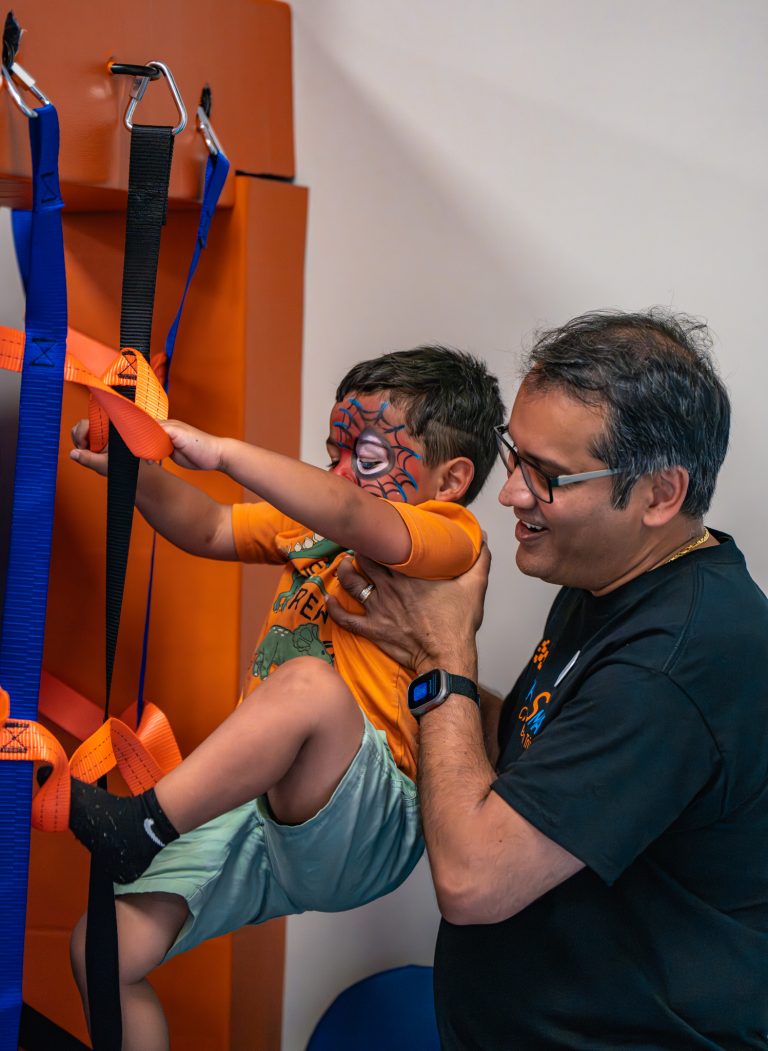
With great power comes great responsibility! This little hero is working on his climbing skills!
Supporting Your Child on the Road to Independence
By Team Therapy Smarts
What skills should your child be able to do independently as they grow up? What is reasonable to expect of them— and of yourself? Independence is a key life skill— but knowing when and how much to give can be a challenge, for parents. The good news? With small steps and consistent reinforcement, independence can be fostered at any age! In this article, team Therapy Smarts has the tools you need to encourage independence, how tools like occupational therapy can help, and insight into what is reasonable to expect for your child.
Encouraging Independence in Toddlerhood
We’ve all heard the phrase “terrible twos” and the ominous warnings of tantrums and toddlerhood. Why are these difficult behaviors happening? Your little one is learning independence — and there are ways to help them nurture it, in a positive way!
With these tools in your back pocket, you can help your child navigate their budding sense of self, and truly enjoy all the incredible skills they’re learning!
Take Your Time
Toddlers can do many of the tasks that older children can— they just need more time to accomplish them! With simple instructions, they can help put toys away, carry a light bag and help feed pets.
Give your child one or two simple tasks to do each day, and make sure to lay on the praise when they accomplish their goals. If these tasks need to be accomplished by a certain time, make sure to add in a buffer zone for your child to accomplish the task, before you need to move on.
Pro tip: Take time for yourself, where you can. Thirty minutes to yourself, ahead of your child’s usual wake window can do wonders to set you up for a successful day!
2. Give Choices
So much of a child’s day is not up to them— and as they test the limits of their independence, this can be a frequent source of frustration and meltdowns. Where you can, consider giving your child a choice! Lay out two outfits for the day and let them decide which one they would like to wear. Or, if they need to help clean something up, let them decide which task to start with.
If your child protests and refuses to choose, consistency is key. Acknowledge your child’s feelings and calmly reiterate their choices. Choices and consistency empower your child to make his or her own decisions.
3. Use Simple Words, Wisely
Phrasing is key. Doing the exact opposite of what you’ve asked is how a child might decide to show their power — and while frustrating, it’s important to avoid engaging in these power struggles, when you can. If a behavior is important to you, such as cleaning up toys in their room before bed, be consistent with your phrasing. When giving choices, you might say, “Would you like to put away blocks or plushies, first?”. If something is a statement, you might say “You need to put your blocks away, before bed.” Keeping things simple and repetitive make expectations clear for your child. While they can make the choice of how to respond, they know what is expected of them.
By establishing these skills early, you can build an effective base for your child to grow from. Feeling empowered to make choices, and proud of their accomplishments will help support key milestones as your child grows, such as attending daycare or preschool.
Developing Independence in Childhood
As toddlers grow into children, they can gradually be given more responsibilities, and more independence with it! Keeping the scales balanced while encouraging exploration and the development of new skills isn’t easy, but it continues to build a critical foundation that will support your child throughout the rest of their lives. Here are a few guidelines to keep in mind:
Let Them Make (Age-Appropriate) Mistakes
At this stage comes a difficult task for many parents: starting to let go of control. Ironically, letting your child fail ultimately sets them up for success, by giving them a learning opportunity.
Let’s say you’ve reminded your child about an upcoming test several times— but they still refuse to sit down and study until the night before. It may be difficult to see your child’s distress or frustration in the aftermath— however, it also provides an invaluable opportunity to sit down, discuss their feelings and brainstorm ways to do better next time. Letting them know that mistakes are okay helps develop a growth mindset that will help them thrive as they grow.
2. Give Them Space
Kids need opportunities to practice many of the independence skills they are learning. While they’ll have some opportunities to navigate these challenges on their own, such as at school, make sure to give them opportunities at home, too. Let them play or work on homework in the next room over— and if you need to check in, try to be discreet! Or, if you notice conflict with a friend or sibling, listen first to see if they can resolve the conflict on their own, before stepping in.
3. Respect Their Efforts
All skills need to be learned, especially with independence. Be patient with your child, and yourself— and remember that perfection isn’t the goal! Say your child is responsible for putting their shoes away, but places them in the wrong cubby. Try to avoid the urge to fix them— this kind of over-correcting, especially if done where your child can see, may discourage them from trying skills for themselves.
The same goes for privileges. Don’t be discouraged if you attempt an independence skill — like walking on the sidewalk without holding hands— and your child makes a mistake, like running off. Just be prepared to step in. Your child may not be ready for the new privilege just yet and losing it is a natural consequence. By helping them focus on the skills they need to earn that privilege back (like knowing how far they can walk ahead) they’ll be ready to try it again, once they’re ready.
Fostering independence as your child grows helps them navigate new situations with confidence. While it can be a difficult line to walk, just remember, the more you do for them, the less they can do for themselves.
Independence in the Teenage Years
Let’s face facts: no one wantsindependence more than teenagers. While teenagers have learned and continue to build many of the skills necessary for independent adulthood, they still require a safety net — the prefrontal cortex, responsible for planning and impulse control, won’t be fully developed until age 25. How can parents walk the line between helicopter and hands-off parenting?
Open Communication is Key


